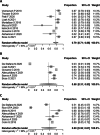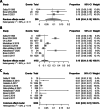Safety and efficacy of cladribine in multiple sclerosis: a systematic review and meta-analysis
- PMID: 37062787
- PMCID: PMC10106322
- DOI: 10.1007/s10072-023-06794-w
Safety and efficacy of cladribine in multiple sclerosis: a systematic review and meta-analysis
Abstract
Background: Previously, several studies investigated the effect of cladribine among patients with multiple sclerosis (MS) as a treatment option. Due to the contradictory results of previous studies regarding the efficacy and safety of cladribine in the MS population, we aimed to conduct a systematic review and meta-analysis by including clinical trials and observational studies in terms of having more confirmative results to make a general decision.
Methods: The three databases including PubMed, Scopus, and Web of Science were comprehensively searched in May 2022. We included the studies that investigated the efficacy and safety of cladribine in patients with MS. Eligible studies have to provide sufficient details on MS diagnosis and appropriate follow-up duration. We investigated the efficacy of cladribine with several outcomes including Expanded Disability Status Scale (EDSS) change, progression-free survival (PFS), relapse-free survival (RFS), and MRI-free activity survival (MFAS).
Results: After two-step reviewing, 23 studies were included in our qualitative and quantitative synthesis. The pooled SMD for EDSS before and after treatment was - 0.54 (95%CI: - 1.46, 0.39). Our analysis showed that the PFS after cladribine use is 79% (95%CI 71%, 86%). Also, 58% of patients with MS who received cladribine remained relapse-free (95%CI 31%, 83%). Furthermore, the MFAS after treatment was 60% (95%CI 36%, 81%). Our analysis showed that infection is the most common adverse event after cladribine treatment with a pooled prevalence of 10% (95%CI 4%, 18%). Moreover, the pooled prevalence of infusion-related adverse events was 9% (95%CI 4%, 15%). Also, the malignancies after cladribine were present in 0.4% of patients (95%CI 0.25%, 0.75%).
Conclusion: Our results showed acceptable safety and efficacy for cladribine for the treatment of MS except in terms of reducing EDSS. Combination of our findings with the results of previous studies which compared cladribine to other disease-modifying therapies (DMTs), cladribine seems to be a safe and effective drug in achieving better treatment for relapsing-remitting MS (RRMS) patients.
Keywords: Cladribine; Disease-modifying therapies; Efficacy; Multiple sclerosis; Safety.
© 2023. Fondazione Società Italiana di Neurologia.
Conflict of interest statement
The authors declare no competing interests.
Figures




Similar articles
-
Immunomodulators and immunosuppressants for relapsing-remitting multiple sclerosis: a network meta-analysis.Cochrane Database Syst Rev. 2024 Jan 4;1(1):CD011381. doi: 10.1002/14651858.CD011381.pub3. Cochrane Database Syst Rev. 2024. PMID: 38174776 Free PMC article.
-
Immunomodulators and immunosuppressants for multiple sclerosis: a network meta-analysis.Cochrane Database Syst Rev. 2013 Jun 6;2013(6):CD008933. doi: 10.1002/14651858.CD008933.pub2. Cochrane Database Syst Rev. 2013. PMID: 23744561 Free PMC article.
-
Treatment with disease-modifying drugs for people with a first clinical attack suggestive of multiple sclerosis.Cochrane Database Syst Rev. 2017 Apr 25;4(4):CD012200. doi: 10.1002/14651858.CD012200.pub2. Cochrane Database Syst Rev. 2017. PMID: 28440858 Free PMC article.
-
Teriflunomide for multiple sclerosis.Cochrane Database Syst Rev. 2016 Mar 22;3(3):CD009882. doi: 10.1002/14651858.CD009882.pub3. Cochrane Database Syst Rev. 2016. PMID: 27003123 Free PMC article.
-
Comparative safety of high-efficacy disease-modifying therapies in relapsing-remitting multiple sclerosis: a systematic review and network meta-analysis.Neurol Sci. 2022 Sep;43(9):5479-5500. doi: 10.1007/s10072-022-06197-3. Epub 2022 Jun 17. Neurol Sci. 2022. PMID: 35713731
Cited by
-
Hypoxic Neuroinflammation in the Pathogenesis of Multiple Sclerosis.Brain Sci. 2025 Feb 26;15(3):248. doi: 10.3390/brainsci15030248. Brain Sci. 2025. PMID: 40149770 Free PMC article. Review.
-
The Role of Extracellular Vesicles and Microparticles in Central Nervous System Disorders: Mechanisms, Biomarkers, and Therapeutic Potential.Cell Mol Neurobiol. 2024 Dec 3;44(1):82. doi: 10.1007/s10571-024-01518-w. Cell Mol Neurobiol. 2024. PMID: 39625540 Free PMC article. Review.
-
Challenges in the Treatment of Xanthoma Disseminatum: Improvement in Disfiguring Facial Lesions with Cladribine and Brief Updated Literature Review.Clin Cosmet Investig Dermatol. 2025 Jun 30;18:1639-1644. doi: 10.2147/CCID.S528561. eCollection 2025. Clin Cosmet Investig Dermatol. 2025. PMID: 40620895 Free PMC article.
-
Screening of RNA methyltransferase NSP16 inhibitors against SARS-CoV-2 coronavirus and study of related mechanisms.Am J Transl Res. 2025 Feb 15;17(2):1237-1250. doi: 10.62347/VUZM7431. eCollection 2025. Am J Transl Res. 2025. PMID: 40092096 Free PMC article.
-
Early clinical effect of cladribine in patients with highly active multiple sclerosis in Mexico.Mult Scler J Exp Transl Clin. 2024 Aug 1;10(3):20552173241260156. doi: 10.1177/20552173241260156. eCollection 2024 Jul-Sep. Mult Scler J Exp Transl Clin. 2024. PMID: 39091340 Free PMC article.
References
-
- Ward M, Goldman MD (2022) Epidemiology and pathophysiology of multiple sclerosis. CONTINUUM: Lifelong Learning in Neurology 28(4):988–1005 - PubMed
Publication types
MeSH terms
Substances
LinkOut - more resources
Full Text Sources
Medical

